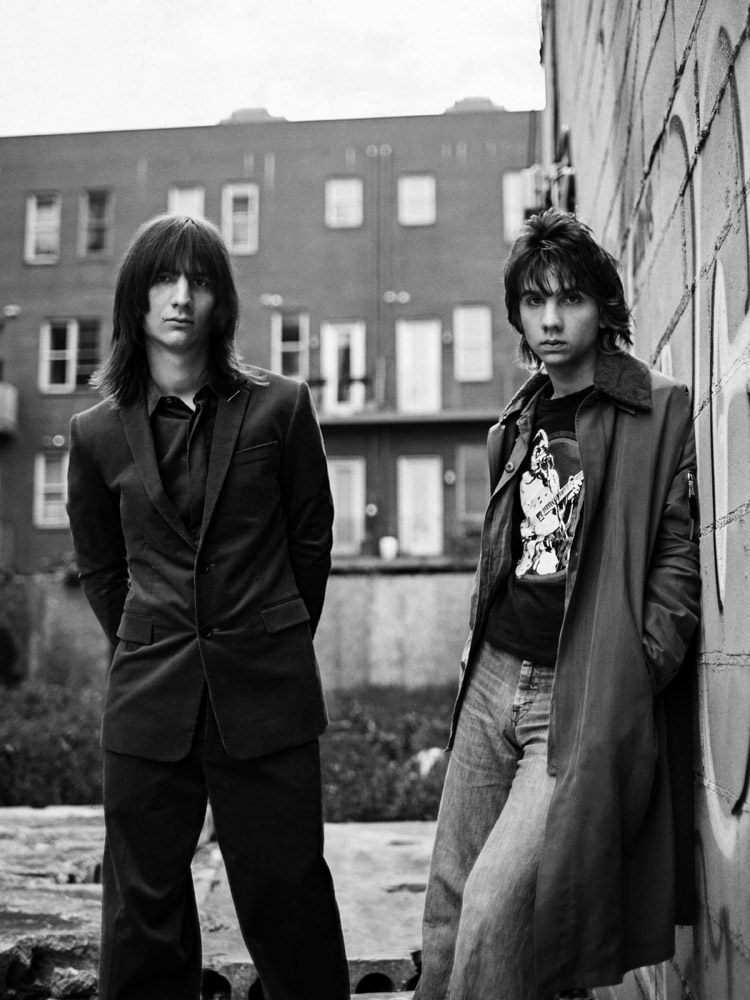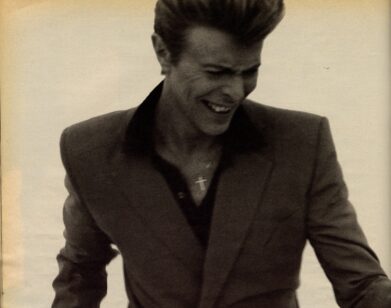Lemon Twigs
For a generation of musicians raised with the internet as a reference library, the blending of genres has become itself a genre. Nowhere is this clearer than in the songs of the Lemon Twigs, composed of the brothers Brian and Michael D’Addario, who extract bits and pieces of prog, glam rock, and power pop, and fuse them into an assured sound very much their own. The ten tracks on Do Hollywood, their 2016 debut, modulate among these influences, as Brian, 20, and Michael, 18, trade back and forth between songwriting and instrument-playing. Some tracks are intricate and orchestral, full of dizzying harpsichord runs and drum solos; others are taut, with Beach Boys-like harmonizing.
The brothers are joined during live shows by the bassist Megan Zeankowski and the keyboardist Danny Ayala, friends of theirs from their hometown of Hicksville, Long Island. Brian sings and plays guitar for the songs that he wrote, and then halfway through the show they switch, with Michael emerging from behind the drum kit to take center stage.
Although the division of labor has worked quite well, Brian and Michael are still figuring things out. Despite having signed a record deal with 4AD, while also touring the world, opening for Phoenix, and playing Coachella (not to mention, charming Elton John)—all in a little over a year—they continue to develop their collaborative songwriting process while absorbing new influences.
Todd Rundgren, a rock legend who knows a thing or two about playing with musical boundaries, spoke to the Twigs about branching out.
TODD RUNDGREN: Twigs! Are you guys at home? You’re working on a new record, right?
MICHAEL D’ADDARIO: We have two tracks almost done. One is Brian’s and one is mine.
RUNDGREN: And is it going smoothly?
MICHAEL: We’ve got all the music, but for some of the tracks, the lyrics aren’t all together.
RUNDGREN: Lyrics are always an issue.
BRIAN D’ADDARIO: For this one, we originally set out to make a concept album. When we wrote the majority of the songs, we were really into the concept. But now that some time has passed, it has occurred to us that we still have to write all these songs about a monkey who goes to school. [all laugh]
RUNDGREN: It’s good to have a concept. When did you start writing seriously?
BRIAN: I think I was, like, 7. [Rundgren laughs] It was basically a rip-off of a song by the Monkees called “The Kind of Girl I Could Love.” Mine was called “Girl.” For the first songs that you wrote, were you old enough to know the difference between writing your own song and writing someone else’s song?
RUNDGREN: I kind of stumbled into it because I really thought of myself as a guitar player. I wrote my first song when I was, like, 18. It wasn’t that I was fascinated with the writing process; it was that I’d put a band together and realized we had to have original material. The very first song I wrote, ironically, was “Hello It’s Me,” which took elements of improvised playing by jazz organist Jimmy Smith. He had a live record where he did this kind of intro to a song, and I simply stole those changes and wrote something on top of it. I didn’t steal it from another song per se; it was just this improvised instrumental thing. After that, I got a bit cleverer about stealing from other people. [all laugh] But songwriting is kind of like plagiarism, anyway, because there are only so many notes. Eventually you’re going to have to incorporate influences, even if you’re not consciously thinking about them. I noticed that the bands that are most often cited in descriptions of your music are the Beach Boys and the Beatles, but I hear so many other things. Can you elaborate on some of the more broad influences that you’ve had? For instance, I am reminded of Queen sometimes in what you’re doing because the arrangements are much more intricate than a typical pop song.
BRIAN: Procol Harum has been a big influence. And, yeah, Queen. When rock people try to write things in a classical style, a lot of the time they come up with similar vibes. It’s a lot of distorted guitars playing whatever your melody is. I think that we purposefully used to say the Beatles and the Beach Boys because that’s kind of a given for a lot of bands, and we didn’t want people to think that we got our sound from a core group of musicians. It’s like, who isn’t influenced by the Beatles and the Beach Boys?
MICHAEL: And it was pretty true when we made the record. I was 15 and Brian was 17, and I really didn’t know a lot of stuff. I didn’t even know a lot of your music at the time. And now our taste is way—
BRIAN: Broader.
RUNDGREN: You guys aren’t like Lennon and McCartney; you write separately, which gives the band the two faces of Twigs. It almost seems as if you aren’t brothers, as if you are just two guys who met each other and started a band. It’s interesting to me that even though you were born only two years apart, you do have uniquely individual ways of writing.
MICHAEL: Lately, we’ve been helping each other out a lot more with the writing, but we do it in a different way. Like, if I have a musical idea that I think will appeal to Brian when he’s working on a song, I’ll suggest it, and he does the same thing for me with my songs.
BRIAN: We try to appeal to each other’s sensibilities.
MICHAEL: There’s still a separation there rather than being one head. I think that the difference in writing styles stems from when we were younger—the first band I was obsessed with was Nirvana. I always gravitated toward heavier stuff.
RUNDGREN: It’s fascinating to me that people can write together. [laughs] I have a hard time collaborating with people. Rick Springfield once came to my house and said, “Let’s try to write something together.” We just sat on the couch and stared at each other. In some ways, writing a song is too personal to me. I’m almost embarrassed to expose my ideas to somebody else before I’ve got them fully developed.
MICHAEL: We do a thing where we almost listen to things for each other. Like, if Brian’s into something, then I don’t bother with it as much because, I don’t know … it’s like, my brother’s doing it so it becomes less cool to me. [Rundgren laughs] I’m really into Neil Young at the moment, but Brian’s not really listening to it. I never really got that into Leonard Cohen, but Brian got super into it.
RUNDGREN: So you guys are still absorbing influences then.
BRIAN: There’s a way I write that runs through all of the stuff I’ve done—and that’s kind of my personality—but I don’t think that the Lemon Twigs has necessarily found its style. I think we’ll figure it out over time, and it might not even be apparent to us when it happens.
RUNDGREN: As a fan, it’s exciting to see a band that’s in creative flux. So far, your one record is the only thing anyone has to judge you by. When the second one drops, you’ll start to create, like, a volume. People will look at you from a different angle when you come out with new material. You’re sort of in an evolutionary phase, and that’s a fun thing to watch or to listen to. You guys were kind of successful child actors. Why did you make the decision to commit to music?
BRIAN: When we were kids, we were totally focused on music. We never really cared about any of the acting stuff. We fell into it because our mom was doing community theater, so we started doing it, too. Then we got an agent, and then we started going out for auditions, and I got into it because any time you feel like you’re good at something, you get into it. But even when I was doing Broadway plays, I would be backstage writing songs.
RUNDGREN: You seem comfortable performing in front of people.
BRIAN: We were so young when we started. Before we were 13, I don’t think we ever felt self-conscious. And then we turned 13, and we felt self-conscious all the time.
RUNDGREN: You’ve been touring like crazy. Can you estimate how many days in the past year you’ve been out on the road?
BRIAN: I think we’ve had two months off. We’ve been touring consistently since July 2016.
RUNDGREN: In other words, you’re on the road so much you have no idea. Oh boy. And after you work on your record, you’re going out again, right?
BRIAN: Yeah. But I don’t think we’re going to be able to finish the record before we go out again. We thought we were going to, but we’re taking too much time just hanging out because we’re so tired.
RUNDGREN: You want to be able to do nothing sometimes. But everybody has their eye on you at this point: “What are they going to do next? When are they going to release something?” It’s the double-edged sword of success.
BRIAN: Yeah. But success is fleeting, as I like to say.
RUNDGREN: As well as having your own individual approaches to songwriting, you each have your own looks from different eras. Brian, you seem to draw from a more mod aesthetic. And Michael, you’re working with a more glam, post-David Bowie kind of thing.
MICHAEL: I change my look based on whatever I’m listening to. I dyed my hair because I was really into Todd Rundgren. [Rundgren laughs] There was a certain point when I dyed it orange like Bowie’s, and now I’m going through a bit of a Neil Young phase, so I’m just wearing Army jackets and looking more boring. The safest thing is to keep changing because I don’t know if I want to establish that we’re one specific thing this early on.
BRIAN: Like we’re a glam band or something.
RUNDGREN: It is part of the package, though. I hate when a band just shows up to a performance in their street clothes, like there is nothing special about the stage. That’s one of the things I like about the Twigs: you have a certain reverence for the stage.
BRIAN: It’s like it became cool not to care.
RUNDGREN: Have you gotten any interest from corporations who want to associate their brand with you?
MICHAEL: We went to one of those big fashion stores in the city, and they were like, “Choose anything you want.” I chose a $15,000 thing, and they wouldn’t give me that. [Rundgren laughs]
BRIAN: We’re pretty wary when we have to post something online to show that we support a brand.
RUNDGREN: Does anyone ask about the other members of the band?
MICHAEL: Sometimes. Not really though.
RUNDGREN: I understand your keyboard player is from your neighborhood.
MICHAEL: Yeah, so is our bass player. We all went to high school together.
RUNDGREN: So it truly is a high school band that made good, right?
MICHAEL: Yeah, and Danny was even in our elementary school.
RUNDGREN: Elementary school band makes good! [all laugh] So, am I still going to do something on your new record?
BRIAN: Yeah! There’s a spot on a couple of songs, but I don’t know if I want to talk about it here.
RUNDGREN: Okay, we’ll sidebar that.
MICHAEL: Yeah. It goes with the concept.
TODD RUNDGREN IS A SINGER-SONGWRITER AND PRODUCER WITH A 50-YEAR CAREER. WHITE KNIGHT, HIS MOST RECENT STUDIO ALBUM, WAS RELEASED IN MAY.







